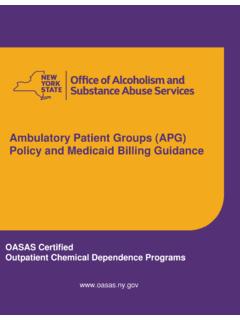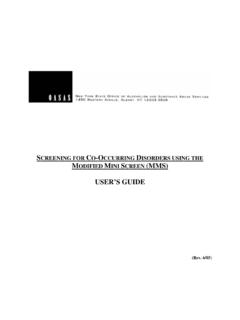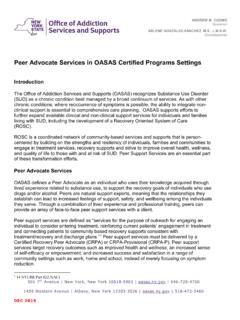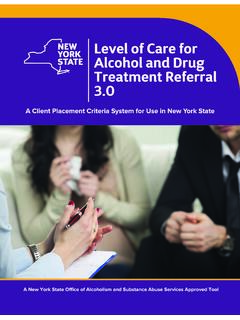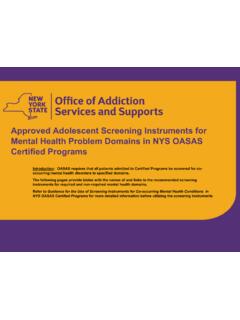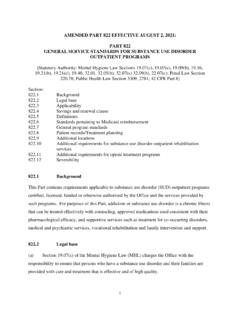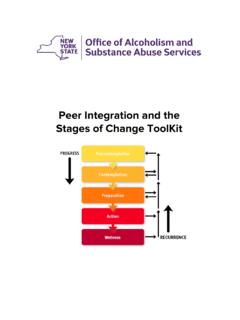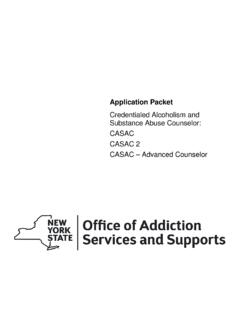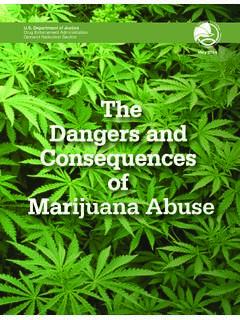Transcription of 14 NYCRR Part 800, as amended March 29, 2019, is amended ...
1 1 14 NYCRR Part 800, as amended March 29, 2019, is amended to read as follows: OASAS TREATMENT SERVICES: GENERALPROVISIONS TITLE 14 NYCRR PART 800 [Statutory Authority: Mental Hygiene Law Sections (e), (b), , (a)] Sec. Legal base Incorporation by reference Definitions Access to Medication Assisted Treatment Waiver Severability Section Legal base (a) Section (e) of the Mental Hygiene Law authorizes the Commissioner of the Office of Alcoholism and substance Abuse Services to adopt standards including necessary rules and regulations pertaining to chemical dependence services. (b) Section (b) of the Mental Hygiene Law authorizes the Commissioner of the Office of Alcoholism and substance Abuse Services to adopt regulations necessary and proper to implement any matter under his or her jurisdiction. (c) Section of the Mental Hygiene Law authorizes the Commissioner of the Office of Alcoholism and substance Abuse Services to adopt any regulation reasonably necessary to implement and effectively exercise the powers and perform the duties conferred by Article 32 of the Mental Hygiene Law.
2 (d) Section (a) of the Mental Hygiene Law authorizes the Commissioner of the Office of Alcoholism and substance Abuse Services to adopt regulations to effectuate the provisions and purposes of Article 32 of the Mental Hygiene Law. Incorporation by reference The following publications and/or federal laws and regulations are incorporated by reference where applicable to all Parts of this Chapter. Publications are filed with the Office of the Secretary of State of the State of New York, One Commerce Plaza, 99 Washington Ave., Albany, NY 12231-0001, and may be viewed at the law libraries of the New York State Supreme Court, the Legislative Library in the NYS Capitol, or viewed by appointment with the New York 2 State Office of Alcoholism and substance Abuse Services, Office of Counsel, 1450 Western Ave., Albany, NY. Copies are also available by writing to the NYS Office of Alcoholism and substance Abuse Services, Office of Counsel, 1450 Western Avenue, Albany, NY 12203-3526; federal documents may be purchased from the Superintendent of Documents, Government Printing Office, Washington 20402.
3 Copies of the Code of Federal Regulations (CFR) are also available at many public libraries and bar association libraries. (a) The most current revision and published edition of The International Classification of Diseases. (b) The most current revision of The OASAS Level of Care for Alcohol and Drug Treatment Referral Protocol or LOCADTR or level of care determination protocol and accompanying Guidelines for Level of Care Determination published by the Office and which is in the public domain. (c) 21 Code of Federal Regulations Part , et seq. regarding regulatory requirements for controlled substances. (d) 42 Code of Federal Regulations Part 2, et. seq. regarding confidentiality of patient records. (e) The most current revision and publication of The Medicare Provider Reimbursement Manual or HIM 15" published by the Department of Health and Human Services' Centers for Medicaid and Medicare Services and available from: Centers for Medicaid and Medicare Services, Division of Communication Services, Production and Distribution Branch, Room 577, East High Rise Building, 6325 Security Boulevard, Baltimore, MD 21207.
4 (f) The most current revision and publication of the Diagnostic and Statistical Manual of Mental Disorders published by the American Psychiatric Association. (g) Health Insurance Portability and Accountability Act of 1996 , et. seq. (HIPAA) regarding patient records. Definitions The following terms are defined for purposes of all Parts of Chapter XXI of this Title, unless a term is defined and indicated as applicable only for purposes of a specific Part. 3 (a) Clinical staff is staff who provide services directly to patients as prescribed in a treatment/recovery plan; clinical staff includes licensed medical staff, credentialed or licensed staff, non-credentialed staff, and student interns. (b) Commissioner means the Commissioner of the Office of Alcoholism and substance Abuse Services, unless otherwise indicated. (c) Diagnosis for purposes of admission, treatment and discharge planning means the identification criteria contained in the most current editions of both the International Classification of Diseases, and the Diagnostic and Statistical Manual.
5 (d) Medical Director . (1) Each program must have a physician designated by the program sponsor to be the medical director. The medical director shall be a physician licensed and currently registered as such by the New York State Education Department and shall have at least one year of education, training, and/or experience in substance use disorder services. The medical director is a physician who has overall responsibility for the following (this overall responsibility may not be delegated): (i) medical services provided by the program; (ii) oversight of the development and revision of [medical] policies, procedures and ongoing training for matters including, but not limited to, [such as routing] routine medical care, specialized services, specialized medications, and medical and psychiatric emergency care, screening for, and reporting of, communicable diseases and infection in accordance with law, public health education including prevention and harm reduction ; (iii) collaborative supervision with the program director of non-medical staff in the provision of substance use disorder services; (iv) supervision of medical staff in the performance of medical services.
6 (v) assisting in the development of necessary referral and linkage relationships with other institutions and agencies including, but not limited to, general or specialty hospitals and nursing homes, health-related facilities, home health agencies, hospital outpatient departments, diagnostic and treatment facilities, laboratories and related resources; (vi) ensuring program compliance with all federal, state and local laws and regulations. (2) All medical directors, whether full-time or part-time, other than medical directors in place as of the effective date of this regulation, must hold a board certification in addiction medicine from a certifying entity appropriate to their primary or specialty board certification. 4 Physicians may be hired as probationary medical directors if not so certified but must obtain certification within four (4) years of being hired. In addition, the medical director must [obtain] have a federal DATA 2000 waiver (buprenorphine-certified), or if hired after the effective date of this regulation, must obtain such waiver within six (6) months of employment.
7 (3) The medical director may serve as medical director of more than one program certified by the Office. (e) Medical staff means physicians, nurse practitioners, registered physician's assistants, and registered nurses licensed and certified by the State Education Department practicing within the scope of, and in accordance with, the terms and conditions of such licenses and certifications, and working with, or under the supervision of a physician, or other medical professional if required by law. (f) Multi-disciplinary team means a team of health professional staff including, at a minimum, one medical staff member (where applicable) as defined in this section, one credentialed alcoholism and substance abuse counselor (CASAC) and one other staff member who is a qualified health professional as defined in this section in a discipline other than alcoholism and substance abuse counseling. If the treatment service has a gambling designation on their operating certificate, the multi-disciplinary team must include Qualified Problem Gambling Professional (QPGP), consistent with this Chapter.
8 (g) Office means the New York State Office of Alcoholism and substance Abuse Services. (h) Peer advocate is staff who hold a credential from a certifying authority recognized by the Commissioner. (i) prescribing professional is any medical professional appropriately licensed under New York State law and registered under federal law to prescribe approved medications. (j) Program means a location wherein a provider is authorized to provide addiction services. (k) Provider means an individual, association, partnership, corporation, public or private agency sponsor, as sponsor is defined in this Part, other than an agency or department of the state, which provides addiction services via one or more Office certified, funded or otherwise authorized program. (l) Qualified Health Professional means any of the professionals listed below, who are in good standing with the appropriate licensing or certifying authority, as applicable, with a 5 minimum of one year of experience or satisfactory completion of a training program in the treatment of substance use disorders: (1) a credentialed alcoholism and substance abuse counselor (CASAC) who has a current valid credential issued by the Office, or a comparable credential, certificate or license from another recognized certifying body as determined by the Office; (2) a counselor certified by and currently registered as such with the National Board for Certified Counselors; (3) a rehabilitation counselor certified by the Commission of Rehabilitation Counselor Certification; (4) a therapeutic recreation therapist certified by the National Council on Therapeutic Recreation or the American Therapeutic Recreation Association.
9 Or a person who holds a baccalaureate degree in a field allied to therapeutic recreation and, either before or after receiving such degree, has five years of full-time, paid work experience in an activities program in a health care setting; (5) a professional licensed and currently registered as such by the New York State Education Department to include: (i) a physician who has received the doctor of medicine ( ) or doctor of osteopathy ( ) degree; (ii) a physician's assistant (PA); (iii) a certified nurse practitioner; (iv). a registered professional nurse (RN); (v) a psychologist; (vi) an occupational therapist; (vii) a social worker (LMSW; LCSW), including an individual with a Limited Permit Licensed Master Social Worker (LP-LMSW) only if such person has a permit which designates the OASAS-certified program as the employer and is under the general supervision of a LMSW or a LCSW; and (viii) a mental health practitioner including: a licensed mental health counselor (LMHC), a marriage and family therapist (LMFT), a creative arts therapist (LCAT), and licensed psychoanalyst; and any mental health practitioner with a Limited Permit.
10 6 (m) Quality improvement means an ongoing process by which a chemical dependence service systematically assesses the adequacy and appropriateness of the chemical dependence services provided to patients and provides recommendations for improvement. (n) Significant other is an individual who is admitted to treatment and manifests psychological, behavioral and/or emotional effects arising from another person s substance use disorder, regardless of whether the other individual is in treatment. A significant other must be determined to be able to actively participate in and benefit from the treatment process. (o) Sponsor (formerly governing authority ) means the provider of service or an entity that substantially controls or has the ability to substantially control the provider of service. For the purpose of this Part, factors used to determine whether there is substantial control shall include, but are not limited to, the following: (1) the right to appoint and remove directors or officers; (2) the right to approve bylaws or articles of incorporation; (3) the right to approve strategic or financial plans for a provider of service; or (4) the right to approve operating or capital budgets for a provider of service.
